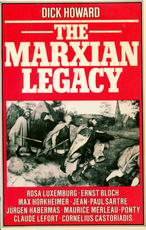

|
|

The Marxian Legacy
Howard, Dick
Publisher: Macmillan Press, London, United KingdomYear First Published: 1977 Year Published: 1979 Pages: 340pp ISBN: 0-333-23246-1 Library of Congress Number: HX56 Dewey: 355.4'09'046 Resource Type: Book Cx Number: CX7510 Working within the Marxian legacy, Howard poses is problems across the fields of philosophy, sociology, political science and history. Abstract: - Table of Contents Preface Part One: Introduction 1. The Theory and Praxis of Dialectical Theory i) Dialectical Method as Critique ii) The Importance of the Difference 2. The Future as Present: Theoretical and Political Implications i) Prelude … and Fugue! ii) Problems of Definition and Method iii) Intellectual Roots iv) Social Roots v) Tactics, Themes and Practice vi) Implications and Questions Part Two: Within Marxism 3. Theory, the Theorist and Revolutionary Practice: Rosa Luxemburg i) Revolutionary Practice and its Theory ii) The Theorist and her Practice iii) Revolutionary Theory 4. Marxism and Concrete Philosophy: Ernest Bloch i) Bases of Bloch's Dialectic: Actuality and Utopia ii) Confrontation with Fascism and Development of the Dialectic iii) Bloch v Frankfurt: Dialectics of Labour and Futurity iv) The Problem of our Heritage Part Three: Using Marxism 5. Towards a Critical Theory: Max Horkheimer i) The Agenda ii) A New Type of Theory iii) Excursus: Herbert Marcuse on the Philosophical Genesis of Critical Theory iv) Political Implications v) The Independence of Critical Theory 6. From Critical Theory towards Political Theory: Jürgen Habermas i) What is Late Capitalism? ii) Marxism and Critical Theory iii) Historical Materialism and Theory of Evolution iv) The Tasks of Philosophy and the Question of the Political v) The Political: Action or Institution? 7. The Rationality of the Dialectic: Jean-Paul Sartre i) The Necessity of a Critique of Dialectical Reason ii) The Foundations of the Dialectic iii) The Dialectic of the Social World iv) The Problem of Revolution v) Concretisation and Critique Part Four: Criticising Marxism 8. From Marxism to Ontology: Maurice Merleau-Ponty i) Why Reread Merleau-Ponyt? ii) Marxism and its Politics iii) Towards a Reformulation iv) The Question Re-posed v) And Now? 9. Bureaucratic Society and Traditional Rationality: Claude Lefort i) Developing Theory and Developing Society ii) The Political and the Philosophical iii) Philosophy Again 10. Ontology and the Political Project: Cornelius Castoriadis i) The Political Critique of the Economic and the Economic Critique of the Political ii) Organisation: The False but Necessary Debate iii) Marxism: The Problem of Metaphysics iv) Ontology: The Status of Theory and the Political Project v) What is Revolution? Notes Index |